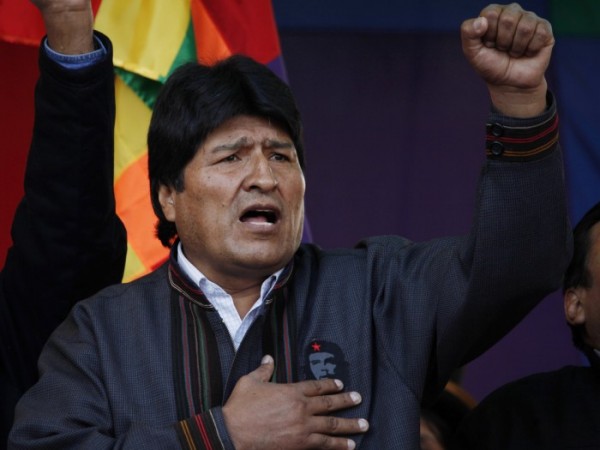
Evo Morales, President of Bolivia, gestures during a parade in La Paz on May 1, 2013. He announced plans to expel the US Agency for Int’l Development from the country, claiming it is conspiring against the Bolivian government. Photo credit: Juan Karita/AP
Over two weeks have passed since Nicolas Maduro’s contested election victory over opposition candidate Henrique Capriles Radonski. Unfortunately, fair democracy appears to remain limited in Venezuela, even after the passing of Hugo Chavez.
Capriles and his supporters have demanded a recount in the closely contested race and refuse to acknowledge Maduro’s victory as legitimate. The government isn’t having any of that, and to demonstrate their resolve the head of National Assembly intends to bar any opposition lawmaker from speaking in legislative session. This prompted the outbreak of fisticuffs in the National Assembly on April 30 — yes, elected officials threw punches at each other. According to an opposition official present when the fighting broke out, “The hardest blows have been to the country. It is the terrible pain of seeing how they seek to trample on an institution that is indispensable for the working of the democratic system.”
Wow. How can you expect people to respect and trust a government if those they chose to represent them are throwing haymakers at each other? This dispute needs to be resolved, and quickly. It does not seem unreasonable to ask for an accurate review of votes. The government’s resistance seems the act of those in power desperate to keep it, and perhaps indicates their genuine fear they might lose it. This could be a key turning point for democracy in Venezuela.
The nature of democracy in Venezuela’s neighbor, Bolivia, is in question as well. On April 30 Bolivia’s constitutional court ruled that President Evo Morales could seek a third term in elections scheduled for Dec. 2014. Although the constitution allows presidents to serve only two consecutive terms (Morales is in his second now), the court ruled his first term shouldn’t count because it started before the constitution took effect.
This decision almost certainly weighed on Morales’ brazen move to expel the U.S. Agency for International Development (USAID) from Bolivia, announced on May 1. Morales claimed the U.S. government’s foreign aid organization “conspired against” the Bolivian people.
While Morales and Chavez have long been critical of U.S. involvement in Latin America (which, admittedly, in some cases has been dubious), this takes brinksmanship to a new level. It seems he is willing to deprive his own people of valuable aid and support to achieve political gain. I don’t see this ending well either.
Both these situations show the lengths to which those in power will go to keep it. Bolivia and Venezuela are proving to be difficult environments for democracy to function.